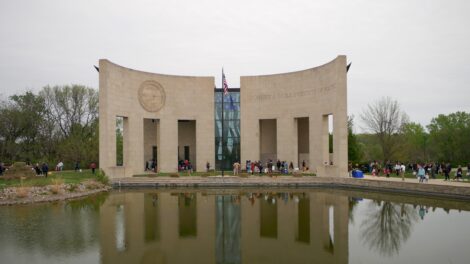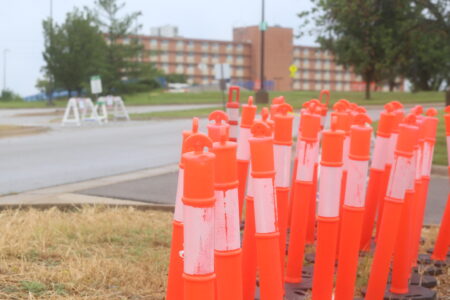KU student from Lawrence who earned prestigious fellowship for international studies proud to represent community

photo by: Contributed
Along with his time studying abroad in Jordan and Morocco, Charlie Johnson was able to travel to other countries in North Africa, including Tunisia and Egypt, where he saw the Sphinx in Giza in 2021.
When Charlie Johnson got a call during one of his virtual classes at the University of Kansas in March, he let it go to voicemail since he didn’t recognize the number.
Johnson, a senior from Lawrence who went to Free State High School, soon saw on the auto-transcription of the voicemail that it was “so and so from Carnegie calling.”
“I started freaking out,” Johnson said.
Johnson, who is majoring in religious studies, political science, history and global & international studies, had applied to the Carnegie Endowment for International Peace to be a James C. Gaither Junior Fellow. The fellowships are awarded to only 15 applicants each year, and once he was able to call back, he found out he was one of them.
“The moment I found out, I was ecstatic and excited at the opportunity,” Johnson said.
As part of the one-year program, Johnson will be assigned to scholars in Carnegie’s Middle East Program in Washington, D.C., assisting them with research and writing on projects related to the Middle East and North Africa.
Johnson said he came upon his focus in studies in the Middle East and North Africa “by chance.” One of his older sisters studied Arabic in college, and he went to visit her in Jordan, which is when he became interested in the Middle East. Johnson said his experience was really eye-opening compared to the way the area is often depicted in the United States. That initial experience was something that was a guiding factor in much of his undergraduate studies.
“I was interested in trying to reconcile my personal experience with my perception before going,” Johnson said.
Because of the COVID-19 pandemic, Johnson said he took a gap year and started independently studying Arabic through an intensive online program. Johnson has gone to Jordan twice to study — including this past year where he had an internship at the Politics and Society Institute in Amman, the country’s capital. Johnson also went to study abroad in Morocco for four months, then served as an office intern for his study abroad program.
Through those experiences, Johnson learned different dialects in Arabic — as well as attempting to learn Uyghur, a language used by a minority ethnic group of the same name in Western China. Additionally, much of his studies at KU focused on minority religious communities in the region, which tied together a lot of Johnson’s interests.
Although that area is a key focus, Johnson said he doesn’t quite know yet what kinds of projects he’ll be working on with Carnegie’s Middle East Program. Typically, the fellows are paired with two or three other researchers to help on projects that can range from climate change to governance to power competition in the region. Johnson said that during his interview, he was told that it is typically “arranged based on regional focuses,” meaning he expects he’ll be working on research projects in North Africa or the Levant, but it still depends on what they need.
As far as the application itself, Johnson said it was a unique experience. First, he had to be vetted by KU to be the school’s nominee. He also was given a prompt by the Carnegie Program, where he was tasked with diagnosing the underlying problems of the region. Johnson said he had an initial idea, then eventually “scrapped it and( went) back to the drawing board.”
Eventually, with guidance from advisers, Johnson wrote a response focusing on the ways government accountability — or the lack thereof — helped lead to discontent and unrest for many people. Johnson talked about how that was a “core issue” during the Arab Spring, but when governments collapsed from the discontent, it sometimes created power vacuums that led to other issues taking over.
Johnson said tackling some of the underlying issues in the region created a broader picture that helped him appreciate how one of his major focuses — the persecution of religious minorities — manifested.
“The application process gave me the opportunity to think about the region in a deeper way and engage with a lot of Carnegie’s own research,” Johnson said.
Of course, Johnson’s application helped lead to him being one of 15 scholars selected across the country for this program, and he is the first KU student or graduate to earn the honor. Erin Wolfram, the program director of the Center for Undergraduate Research & Fellowships, said in a press release that students of Johnson’s caliber are “truly unique,” and she was impressed by his “drive, intellect and maturity.”
“I am delighted to see his efforts rewarded through his selection as a James C. Gaither Junior Fellow,” Wolfram said.
Johnson said as a proud “townie” born and raised in Lawrence, it really does feel like he is a “product of this community” and is proud to represent it moving forward. Johnson noted in various programs he has done in Washington before, the Midwest, especially the Great Plains region, can feel “absent.” Being able to be a proud Jayhawk in his work is something he is excited to take with him in his one-year fellowship and the rest of his career.
“It’s great to bring more of that Midwestern voice to the East Coast and represent KU while doing it,” Johnson said.

photo by: Contributed
Charlie Johnson at his internship with the Politics and Society Institute in Amman, Jordan. Johnson, a KU student and Lawrence-native, won a prestigious James C. Gaither Junior Fellowship.

photo by: Contributed
Charlie Johnson (left) during a trip to Merzouga, a town in the Saharan Desert, while he was interning in Morocco in 2023. Johnson, a KU student and Lawrence-native, won a prestigious James C. Gaither Junior Fellowship.

photo by: Contributed
Charlie Johnson in Downtown Amman, Jordan in 2024. Johnson studied there twice, most recently in the past summer.







